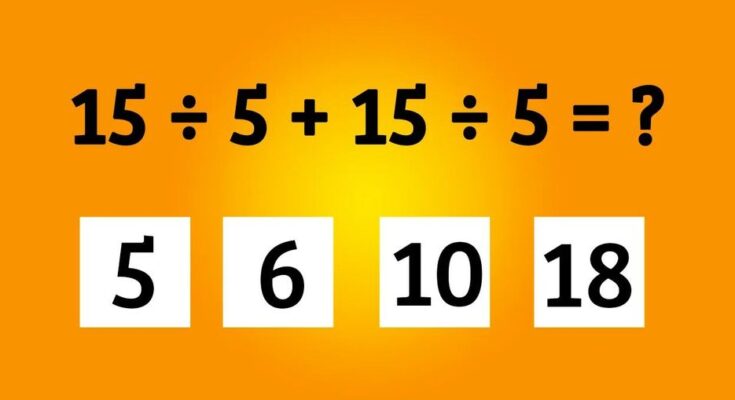
The Challenge Awaits
Mathematics can often feel like a daunting mountain to climb, especially when faced with complex equations that seem to stretch our minds. But what if tackling these challenges could be fun? Today, we invite you to engage your brain with a tricky equation that might just have you scratching your head. So, grab a pencil and paper—let’s dive into the fascinating world of mathematics!
Understanding Complex Equations
What Makes an Equation Complex?
A complex equation typically involves variables, coefficients, and mathematical operations that require critical thinking and problem-solving skills. These equations can include polynomials, fractions, or even exponential terms that push the boundaries of our understanding.
Why Solve Equations?
So why should you bother? Solving complex equations sharpens your analytical skills and enhances your ability to think critically. Plus, it can be incredibly satisfying to crack a tough problem! Think of it as a workout for your brain—a way to keep it fit and agile.
The Equation at Hand
Here’s the complex equation we challenge you to solve:
2×2+3x−5=02x^2 + 3x – 5 = 02×2+3x−5=0
Can you feel the excitement? Don’t worry if it looks intimidating; we’ll walk you through the process!
Breaking Down the Equation
Identify the Components
The first step in solving any equation is to identify its components. In our equation:
- 2x22x^22×2 is the quadratic term.
- 3x3x3x is the linear term.
- −5-5−5 is the constant term.
This equation is a standard quadratic equation in the form of ax2+bx+c=0ax^2 + bx + c = 0ax2+bx+c=0, where a=2a = 2a=2, b=3b = 3b=3, and c=−5c = -5c=−5.
Methods to Solve Quadratic Equations
You have a few options when it comes to solving quadratic equations. Let’s explore them!
1. Factoring
Factoring involves breaking down the equation into simpler components. However, this method requires that the equation can be factored neatly, which isn’t always possible.
2. Completing the Square
Completing the square is a method where you manipulate the equation to form a perfect square trinomial. This technique can be handy but may require a few extra steps.
3. The Quadratic Formula
The most reliable method for solving any quadratic equation is the quadratic formula:
x=−b±b2−4ac2ax = \frac{{-b \pm \sqrt{{b^2 – 4ac}}}}{2a} x=2a−b±b2−4ac
Let’s apply this formula to our equation!
Applying the Quadratic Formula
Step 1: Identify aaa, bbb, and ccc
From our equation 2×2+3x−5=02x^2 + 3x – 5 = 02×2+3x−5=0, we have:
- a=2a = 2a=2
- b=3b = 3b=3
- c=−5c = -5c=−5
Step 2: Calculate the Discriminant
The discriminant is the part under the square root in the quadratic formula, calculated as:
D=b2−4acD = b^2 – 4ac D=b2−4ac
Substituting our values:
D=32−4(2)(−5)=9+40=49D = 3^2 – 4(2)(-5) = 9 + 40 = 49 D=32−4(2)(−5)=9+40=49
Step 3: Solve for xxx
Now, we can plug the values into the quadratic formula:
x=−3±492(2)x = \frac{{-3 \pm \sqrt{49}}}{2(2)} x=2(2)−3±49
Since 49=7\sqrt{49} = 749=7, we have:
x=−3±74x = \frac{{-3 \pm 7}}{4} x=4−3±7
This gives us two potential solutions:
- x=−3+74=44=1x = \frac{{-3 + 7}}{4} = \frac{4}{4} = 1x=4−3+7=44=1
- x=−3−74=−104=−52x = \frac{{-3 – 7}}{4} = \frac{-10}{4} = -\frac{5}{2}x=4−3−7=4−10=−25
Final Solutions
So, the solutions to our complex equation 2×2+3x−5=02x^2 + 3x – 5 = 02×2+3x−5=0 are:
- x=1x = 1x=1
- x=−52x = -\frac{5}{2}x=−25
The Satisfaction of Solving
There you have it! You’ve successfully tackled a complex equation. Remember, every equation you solve helps build your math skills and boosts your confidence.
Why Keep Practicing?
The Benefits of Regular Practice
Mathematics is like a muscle; the more you exercise it, the stronger it gets. Regular practice will help you tackle even the trickiest equations with ease. Plus, solving puzzles can be a fun way to spend your free time!
Join the Community
Why not challenge your friends or family? You can create a friendly competition to see who can solve equations the fastest. It’s a great way to make math more engaging!

Wrap-Up
Whether you’re a seasoned math expert or just starting your journey, remember that tackling complex equations can be a rewarding experience. So, are you ready for the next challenge? Keep pushing the boundaries of your mathematical knowledge, and you might just surprise yourself with what you can achieve!
